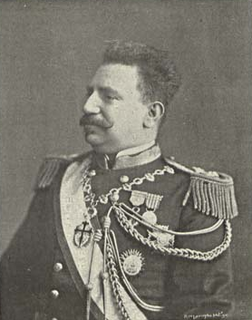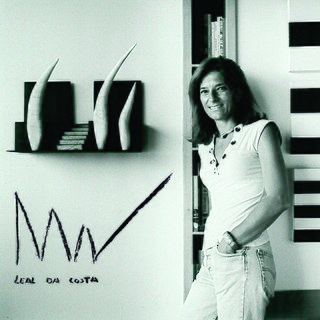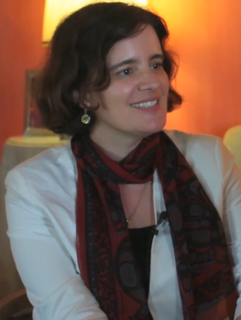Guida Costa is a musician born under the name Maria Margarida de Almeida Costa on November 26, 1964, in Lisbon, Portugal (in the city's civil parish known as Lapa).
She is chiefly a classical and jazz musician, moreover her musical style is frequently experimental - contemporary music. Her principal instruments are voice, trombone and euphonium.
She emigrated with her family to Canada in 1967.
As an artist (fine arts), she signs under the name Guida Almeida and has had her work exhibited on both sides of the Atlantic.
She specialized in Contemporary Music at the Contemporary Music Encounters - Gulbenkian Foundation, Universidade Nova de Lisboa - Faculdade de Ciências Sociais e Humanas, McMaster University, and at the Lisbon National Conservatory among other places. At these locations her music studies were led by: Jorge Peixinho, Constança Capdeville, Karlheinz Stockhausen, Rui Vieira Nery and others. She studied the Trombone at schools and masterclasses with: Darrell Gillespie, Emidio Coutinho, Roger Bobo, and Eric Crees among other brass players/teachers.
Besides her solo work, groups in which she presently performs are:

The culture of Portugal is a very rich result of a complex flow of many different civilizations during the past millennia. From prehistoric cultures, to its Pre-Roman civilizations, passing through its contacts with the Phoenician-Carthaginian world, the Roman period, the Germanic invasions of the Suebi, Buri and Visigoths, Viking incursions, Sephardic Jewish settlement, and finally, the Moorish Umayyad invasion of Hispania and the subsequent expulsion, during the Reconquista, all have made an imprint on the country's culture and history.

Maria Esteves de Medeiros Victorino de Almeida, DamSE, known professionally as Maria de Medeiros, is a Portuguese actress, director, and singer who has been involved in both European and American film productions.

The Cinema of Portugal started with the birth of the medium in the late 19th century. Cinema was introduced in Portugal in 1896 with the screening of foreign films and the first Portuguese film was Saída do Pessoal Operário da Fábrica Confiança, made in the same year. The first movie theater opened in 1904 and the first scripted Portuguese film was O Rapto de Uma Actriz (1907). The first all-talking sound film, A Severa, was made in 1931. Starting in 1933, with A Canção de Lisboa, the Golden Age would last the next two decades, with films such as O Pátio das Cantigas (1942) and A Menina da Rádio (1944). Aniki-Bóbó (1942), Manoel de Oliveira's first feature film, marked a milestone, with a realist style predating Italian neorealism by a few years. In the 1950s the industry stagnated. The early 1960s saw the birth of the Cinema Novo movement, showing realism in film, in the vein of Italian neorealism and the French New Wave, with films like Dom Roberto (1962) and Os Verdes Anos (1963). The movement became particularly relevant after the Carnation Revolution of 1974. In 1989, João César Monteiro's Recordações da Casa Amarela won the Silver Lion at the Venice Film Festival and in 2009, João Salaviza's Arena won the Short Film Palme d'Or at the Cannes Film Festival. Several other Portuguese films have been in competition for major film awards like the Palme d'Or and the Golden Bear. João Sete Sete (2006) was the first Portuguese animated feature film. Portuguese cinema is significantly supported by the State, with the government's Instituto do Cinema e do Audiovisual giving films financial support.

Lura is a Portuguese singer and musician, of Cape Verdean descent. Her compositions are based on traditional Cape-Verdean music as for example the Morna, Funaná and Batuque, and influenced by African and contemporary Western music.

Francisco António de Almeida was a Portuguese composer and organist.

The creation of art in the geographic area now known as Brazil begins with the earliest records of its human habitation. The original inhabitants of the land, pre-Columbian Indigenous or Natives peoples, produced various forms of art; specific cultures like the Marajoara left sophisticated painted pottery. This area was colonized by Portugal in the 16th century and given the modern name of Brazil. Brazilian art is most commonly used as an umbrella term for art created in this region post Portuguese colonization.
Paleka is a Portuguese percussionist in the genres of jazz, contemporary music, and world music.

Carlos Azevedo was a Portuguese composer and pianist.
Maria Clotilde Belo de Carvalho Rosa Franco, known as Clotilde Rosa, was a Portuguese harpist, pedagogue and composer.

José Maria de Sousa Horta e Costa, CavA, OA, OSE, also known as José Maria de Sousa Horta e Costa (de) Almeida e Vasconcelos, was a Portuguese soldier, politician, and diplomat. He was colonial Governor of Macau and India.
Portuguese contemporary art is all the art produced in Portugal after the Carnation Revolution; however, even before then, there were already some artists that could be characterized as contemporary.
Milú was a Portuguese actor and singer.
Sofia Areal is a Portuguese abstract painter, whose works adhere mostly to organic non-geometrical forms and a strong chromatic focus. Besides painting and drawing, Areal's work involves collage, textile design, and scenography.

Campo de Ourique is a freguesia and district of Lisbon, the capital of Portugal. Located in the historic center of Lisbon, Campo de Ourique is east of Alcântara, north of Estrela, west of Santo António, and south of Campolide. The population in 2011 was 22,120.

Helena AlmeidaGOIH was a Portuguese artist known for her work in photography, performance art, body art, painting and drawing.

Maria Ana de Sousa Leal da Costa, is a Portuguese sculptor.
Virginia de Castro e Almeida was a Portuguese writer. She is remembered for being a pioneer in Portuguese children’s literature, translating important cultural texts, and as being a film director and founding her own film company, Fortuna Films.
Maria Helena Ferreira Chaves da Costa Dias (1917-1994) was a Portuguese writer

Adriana de Vecchi was a Portuguese cellist, Montessori-trained educator and founder of a music school for children in Lisbon.

Mariana Guimarães Vieira da Silva is a Portuguese sociologist and politician who currently serves as Minister of State and Minister of the Premiership in António Costa's XXII Constitutional Government.